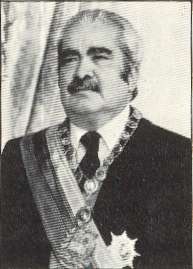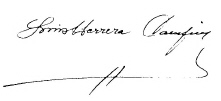- Luis Herrera Campins
Infobox_President | name=Luis Herrera

order=56thPresident of Venezuela
term_start=March 12 ,1979
term_end=February 2 1984
predecessor=Carlos Andrés Pérez
successor=Jaime Lusinchi
office3=Senator for life
term_start3=February 2 ,1984
term_end3=December 20 ,1999
birth_date=May 4 ,1925
birth_place=Acarigua , Portuguesa,Venezuela
death_date=death date and age|2007|11|9|1925|5|4
death_place=Caracas ,VEN
party=Copei
religion=Roman Catholic

spouse=Betty Urdaneta| |Luis Herrera Campins (
May 4 1925 –November 9 2007 ) was President ofVenezuela from 1979 to 1984. He was elected to one five-year term in 1978. He was a member of theCOPEI party.Early Life and career
Luis Herrera was born in
Acarigua , Portuguesa. He was 21 years old when the Social Christian PartyCopei was created, and he was one of the founders inAcarigua , Portuguesa. At the school "La Salle" of "Barquisimeto", he completed his high school degree in 1942. During that time he started work as a politician and journalist at the age of fifteen, working for the Newspaper "El impulso", in "Surcos" and the weekly magazine of the Student National Union. His law studies from theCentral University of Venezuela were suspended in 1952 and he was imprisoned for four months in the "Cárcel Modelo" (Model Jail) by the dictatorial regime of Perez Jimenez. Shortly after, he continued pursuing his college degree and graduated as a lawyer in 1955 at theUniversidad de Santiago de Compostela .He started parliamentary work in 1947, when he was elected deputy to the Legislative Assembly of Portuguesa State. From 1959 to 1979, in four constitutional periods he attended Congress as a deputy or senator representing
Lara and Portuguesa. InMarch 12 ,1979 , he became the President of Venezuela after his election onDecember 3 ,1978 .Presidency
Luis Herrera won the December 1978 presidential elections for COPEI, replacing the social democrat
Carlos Andrés Pérez of the Democratic Action (AD) party, who had nationalised the oil industry at the height of the boom in 1975. Oil revenues continued to rise during the early years of Herrera's presidency. Herrera had adirigiste view of the Government's economic role, which involved channelling public funds into agricultural and industrial projects, paying generous subsidies and controlling the prices of many goods. His Government continued President Pérez's policy of borrowing on a world market awash with petrodollars, and by the early 1980s Venezuela owed the banks more than $20 billion. The Government's tacit assumption was that oil prices would remain high forever, and would sustain high levels of public and private consumption.Luis Herrera developed a program of cultural development and reformed the education program, implementing the common basic cycle of nine years. He also tried to make adjustments to the democratic system. In regard to economics, he began with the policy of liberalisation of prices and at the end of his mandate introduced a series of exchange measures with dramatic results. The
Venezuelan bolívar had been pegged at 4.30 to the dollar, but ended up something more than 15 bolivars by unit (Black Friday,February 18 ,1983 ) - this produced a misalignment in the national economy. This was apparently the result of a “computational error” at the Central bank of Venezuela, declaring “collapsed” the international reserves.Moved in part by territorial claims, Herrera developed a muscular foreign policy. He signed an agreement with
Mexico in 1980 to jointly provide Central American and Caribbean countries with a steady flow of oil, a precursor of Hugo Chávez’s wide-reaching oil diplomacy in the developing world. In 1982 Luis Herrera sided withArgentina in its war with Britain over the Falklands, adroitly exploiting anti-British and anti-American sentiment to boost his flagging popularity. His support for Argentina came while he was asserting Venezuela’s longstanding claim to more than half of neighboringGuyana , a former British colony.Later life
By the time Herrera's term ended, the economy was in meltdown, poverty and hardship were widespread and the voters turned on the ruling Christian Democrat, ejecting him from office in the December 1983 elections. After the end of his presidency Herrera remained influential in the Copei party, becoming its president in 1995.
In 2001 Herrera made headlines when gunmen stole his car . Afterward, he could be seen on foot wearing old clothes and carrying his own groceries. He underwent surgery for two years for an abdominal aneurysm that led to a kidney infection and other complications. By the time he died, he was already retired from Venezuelan politics. Luis Herrera is survived by his wife Betty Urdaneta and three children.
References
* [http://www.gobiernoenlinea.gob.ve/venezuela/perfil_presidente37.html Luis Herrera Campins] — Official biography (but rather biased, based on historical view of current Venezuelan administration)
* [http://www.efemeridesvenezolanas.com/html/campins.htm Luis Herrera Campins]
* [http://www.timesonline.co.uk/tol/comment/obituaries/article2864910.ece Obituary in "The Times", 14 November 2007]
* [http://www.iht.com/articles/ap/2007/11/09/america/LA-GEN-Venezuela-Obit-Herrera.php Obituary] from the "International Herald Tribune "
Wikimedia Foundation. 2010.
